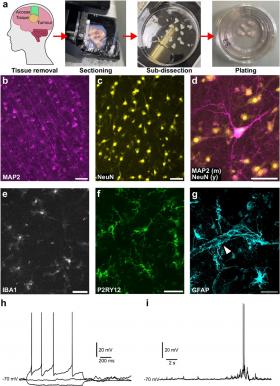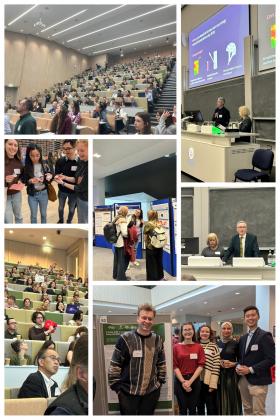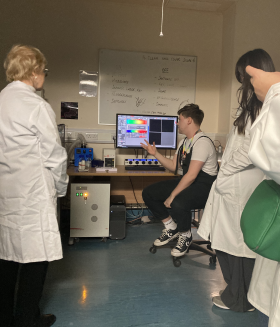Latest news

This short video summarises the findings of a team involving our Centre for Clinical Brain Sciences as well as colleagues from the University of Nottingham and the University of Texas at Dallas.

The Durrant lab have broken new ground. Using live brain tissue, they have shown for the first time how a toxic form of a protein linked to Alzheimer’s can stick to and damage synapses. Next steps: developing drugs to combat this!

As ever, our much-hyped and eagerly anticipated annual Neuroscience Day was a great success this year. This packed one-day conference brought together nearly 400 colleagues from across our vast and diverse community at the University of Edinburgh.

A team of researchers from Tom Gillingwater's lab, colleagues from UMC Utrecht and CNR Trento, have uncovered the complex series of molecular changes that occur in motor neurons around the time of birth, when they undergo a process known as synapse elimination.
Professor David Lyons and his lab colleagues, Toby Shaw-McGrath and Julia van de Korput, are currently featuring on the MS Society's STOP MS billboard campaign. See if you can spot them around town!

As part of Brain Awareness Week 2025, Dr Rana Fetit, a postoc in Anna Williams' lab, delivered a number of workshops at Danderhall Primary School and

By Hannah Gofton
There is a pressing need to investigate the neurodevelopmental consequences of early-onset epilepsy and the risk factors contributing to them. Understanding these neurodevelopmental issues and their associated risks is crucial for improving patients’ quality of life and implementing early interventions to mitigate these adverse effects.

Professor Martyn Pickersgill was recently awarded funding for his project, 'Neurology Navigates Neurotech (3N): Understanding the Experiences and Expectations of Neurology Clinicians in relation to the Promise of Precision Neurotechnology’. This award forms part of a £69 million ARIA programme of 18 projects aimed at unlocking new methods to interface with the human brain at the circuit level, with unprecedented precision. This ground-breaking programme is seeking to address some of the most complex and devastating brain disorders which will impact millions of people worldwide.

This week, the Edinburgh Neuroscience team were delighted to have the opportunity to join a lab tour. CDBS Lab Manager, Jane Tulloch was hosting a group of visitors from Alzheimer Scotland (AS) who had an array of lived experiences of dementia - those living with the disease, carers, advisors and health professionals.

Congratulations to Grant Marshall from Cathy Abbott's lab who has received a Scottish Neurological Research Fund 2024 award for his project, Development of Knockdown-Replace Vectors for eEF1A2-Related Neurodevelopmental Disorder. This is a joint with Joe Symonds from the University of Glasgow.

